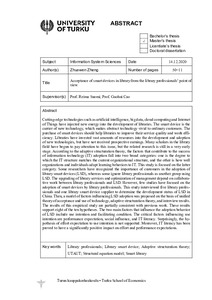Acceptance of smart devices in library from the library professionals’ point of view
Zheng, Zhuowen (2020-12-17)
Acceptance of smart devices in library from the library professionals’ point of view
Zheng, Zhuowen
(17.12.2020)
Julkaisu on tekijänoikeussäännösten alainen. Teosta voi lukea ja tulostaa henkilökohtaista käyttöä varten. Käyttö kaupallisiin tarkoituksiin on kielletty.
avoin
Julkaisun pysyvä osoite on:
https://urn.fi/URN:NBN:fi-fe20201223102875
https://urn.fi/URN:NBN:fi-fe20201223102875
Tiivistelmä
Cutting-edge technologies such as artificial intelligence, big data, cloud computing and Internet of Things have injected new energy into the development of libraries. The smart device is the carrier of new technology, which makes abstract technology vivid to ordinary customers. The purchase of smart devices should help libraries to improve their service quality and work efficiency. Libraries have invested vast amounts of resources into the development and adoption of new technologies, but have not received prospective earnings. Many scholars in the library field have begun to pay attention to this issue, but the related research is still in a very early stage. According to the adaptive structuration theory, the factors that contribute to the success of information technology (IT) adoption fall into two broad categories: one is the degree to which the IT structure matches the current organiza-tional structure, and the other is how well organizations and individuals adapt learning behaviors to IT. This study is focused on the latter category. Some researchers have recognized the importance of customers in the adoption of library smart devices (LSD), whereas some ignore library professionals as another group using LSD. The upgrading of library services and optimization of management depend on collaborative work between library professionals and LSD. However, few studies have focused on the adoption of smart devices by library professionals. This study interviewed five library professionals and one library smart device supplier to determine the development status of LSD in China. Then, a model of factors influencing LSD adoption was proposed on the basis of unified theory of acceptance and use of technology, adaptive structuration theory, and interview results. The results of this empirical study are partially consistent with previous work. These results support eight of the ten hypotheses. The two main factors that influence the adoption behavior of LSD include use intention and facilitating condition. The critical factors influencing use intention are performance expectation, social influence, and IT literacy. Surprisingly, the hypothesis of effort expectation to use intention is not supported. Moreover, IT literacy has been proved to have a significantly positive impact on effort and performance expectations.
